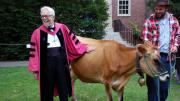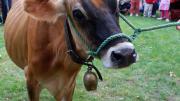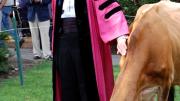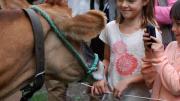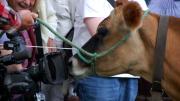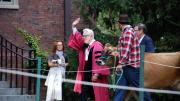A clinking cowbell. Veggie comestibles. Mo[oooo]vere ad Deum et ruminare and the Udderly Tuba Ensemble jazzing up “Old MacDonald.” Happily blending the University’s twenty-first-century ecological slogan—“Green is the new Crimson”—with centuries-old Harvard tradition, a Jersey cow graced and grazed in the Yard on September 9, admired by throngs of spectators. “Faith,” ordinarily resident at The Farm School, in Athol, Massachusetts, “is the real celebrity today,” declared Hollis professor of divinity Harvey Cox, who engineered her appearance. Perhaps it shouldn’t be all that odd to see a cow in Harvard Yard, he told the crowd, as human beings learn how much closer they need to be to nature, and how they must nurture and preserve their surroundings for future generations.
 The bucolic event let Cox assert his professorship’s
traditional right of grazing a cow in Harvard Yard (see “Holy Cow”)—the “eighteenth-century equivalent of parking privileges,” said the Reverend
Peter J. Gomes, Pusey minister in the Memorial Church, in an historical
introduction. The celebration was also a coming-out party for Cox’s new book, The
Future of Faith, and a retirement party for Cox
himself, who has stepped down, Gomes noted, after 44 years “of laboring in this
vineyard.” (That labor, Gomes added, included the famous course “Jesus and the
Moral Life,” which “saved many an undergraduate from a fate worse than a C+.”)
The bucolic event let Cox assert his professorship’s
traditional right of grazing a cow in Harvard Yard (see “Holy Cow”)—the “eighteenth-century equivalent of parking privileges,” said the Reverend
Peter J. Gomes, Pusey minister in the Memorial Church, in an historical
introduction. The celebration was also a coming-out party for Cox’s new book, The
Future of Faith, and a retirement party for Cox
himself, who has stepped down, Gomes noted, after 44 years “of laboring in this
vineyard.” (That labor, Gomes added, included the famous course “Jesus and the
Moral Life,” which “saved many an undergraduate from a fate worse than a C+.”)
Faith’s arrival just before 4 p.m. drew students, tourists, and Cox’s family, friends, colleagues, and admirers to the slope in front of Memorial Church. They heard Gomes, a Baptist, extol fellow Baptists Cox and Thomas Hollis, the English merchant whose many gifts to colonial Harvard included the creation in 1721 of the Hollis chair in divinity, the oldest endowed professorship in North America. Evoking that long-ago College with a Latin oration, Divinity School student Travis Stevens mentioned Faith’s dissertation topic, “The Secular Pasture: MOOOving toward God Even While Chewing Your Cud.” Cox told of falling in love with Faith at the Farm School, and then learning her real name: “Pride.” Any professional concerns about that unfortunate circumstance, he announced cheerfully, had been assuaged by anthropologist Daniel Lieberman, who told him, “Harvey, at Harvard we do not consider pride to be a sin.”
At 5 o’clock, a convivial procession stretching almost a block long followed Harvard police officers and the Udderly Tubas to the Divinity School for tributes, light refreshment, and music by Soft Touch (the “finest big band in the New England area,” in which Cox plays tenor sax). Faith was milked as Cox’s colleague Diana Eck, a scholar of Hinduism, spoke of the role cows play in Indian life and culture, where twilight is the “cow-dust hour.” Cox invited his audience to ponder the wonderful metaphor of “one of the loveliest of God’s creatures, a dairy cow, grazing contentedly” between the Divinity School and the University’s high-tech science labs which together, he said, offer the energy, the moral will, the spiritual vision, and the know-how to preserve the planet. Then he closed the official party program with a choral premiere of “The friendly cow…,” by Robert Louis Stevenson—sung to the tune of “Amazing Grace.”
